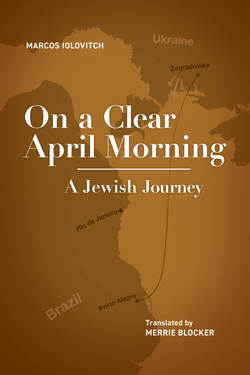Читать книгу On a Clear April Morning - Marcos Iolovitch - Страница 9
На сайте Литреса книга снята с продажи.
ОглавлениеAcknowledgements
The publication of this translation and accompanying essays only exists because of the support and kind assistance of so many. First, I want to thank Leo and Tania Iolovitch for entrusting me with the translation of their father’s beautiful novel and for sharing so many archival resources. And of course, a warm hug of gratitude to the god-mother of this effort, my good friend Lenora Rosenfield, who introduced me to the Iolovitch family. The god-father of this effort, although his early passing doesn’t allow him earthy knowledge of this publication, is Moacyr Scliar, who gave me a copy of this work that had so inspired him, a copy I kept for almost thirty years promising myself that someday I would bring it to the world at large. Moacyr, thank you for this treasure. And, of course, my thanks to Judith Scliar for allowing me to publish my translation of Moacyr’s preface to the second Portuguese edition of this novel.
To Professor Regina Igel of the University of Maryland, I send so many thanks for encouraging me when I first thought of translating Marcos Iolovitch’s novel and for recommending the translation for publication and for support from the Brazilian National Library’s Program for the Translation and Publication of Brazilian Authors. And to Cella and Norman Manea for their continual appreciation for the importance of this translation.
Next, I want to thank Tatiana Ballalai and Isabel Manuela Estrada Portales for helping me assure that this translation was as faithful to Iolovitch’s beautiful choice of words and phraseology as it could be. But of course, any errors that remain are my responsibility.
I then want to thank my English language readers who helped me assure that the translation flowed, my friends Diane and Caitlin Fitzgerald, Ellen Sarkisian, and Miki Farcas, my cousin Susan Friedland and my brother and sister Michael Blocker and Elizabeth Ebaugh. To another old friend, Evan Friedman, I send thanks for pointing out to me, not only that Baron Hirsch assisted Jewish farmers in the United States as well as in South America, but that my own grandfather was a recipient of that aid. And to my husband, Ricardo Merlo, I owe many thanks for his daily support throughout this years-long process and his patience as he read out loud endless chapters so I could check that each word and phrase were correctly translated.
To Alessandra Anzani, Darrell Lockhart, and Academic Studies Press, I send my gratitude for believing in the value of this book and for bringing it to publication.
For helping me understand from where this book blossomed and for giving me the information I needed to explain that process to English-language readers, I want to thank the people of the United States and the staffs of the Library of Congress and the US National Archives. It is because the American people truly believe that information should be accessible to all and are willing to invest their tax dollars in that endeavor that I was able to obtain the information included in the preface and afterword. Thank you for giving me and all people from everywhere these opportunities and for making me proud once more of our national values.
For essential support in obtaining primary sources only available in Porto Alegre, I send my gratitude to Anita Bruner and the Marc Chagall Jewish Cultural Institute. I must note that it was Anita who gave me the strength to push forward and find a publisher. When she offered to translate my afterword and publish it in the Marc Chagall Federal University of Rio Grande do Sul web journal Webmosaica, I realized this work really mattered.
And I must thank the Brazilian historians Isabel Gritti, Nelson Boeira, and Rene Gertz for sharing their works and for helping me convince myself that my interpretations were indeed valid. I also send to the beyond a warm embrace for my old friend, the historian Sandra Jatahy Pesavento, who also passed away before I began this translation. Reading your works on the intellectual history of Porto Alegre not only gave me crucial information, it allowed me to enjoy once more our sharing of ideas over a cafezinho.
To the Brazilian National Library and the Brazilian people who fund this marvelous institution, I send my gratitude for supporting this publication through the Library’s Program for the Translation and Publication of Brazilian Authors. To receive this recognition from the preserver of Brazil’s literary treasures is a great honor for Mr. Iolovitch, an immigrant from a tiny village in a far off land, who loved his adopted language so much that he didn’t just want to give us a story, he wanted to give us Portuguese in all its poetic possibilities.
And finally, and most importantly, I send thanks to the man I have grown to love very much, Marcos Iolovitch. It is because he had such a profound understanding of the human drama, because he had such a deep affection for those near and far, and because he realized that he had an important story to tell, an important addition to our narration of the human experience, that we have been given this piece of history in all its poetry.
Merrie Blocker, Silver Spring, Maryland, February, 2020
